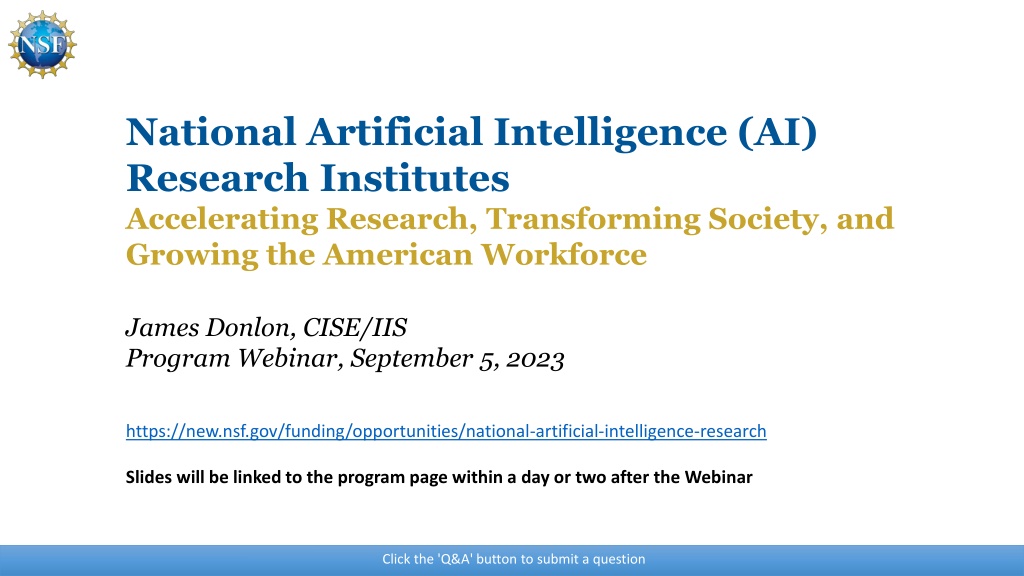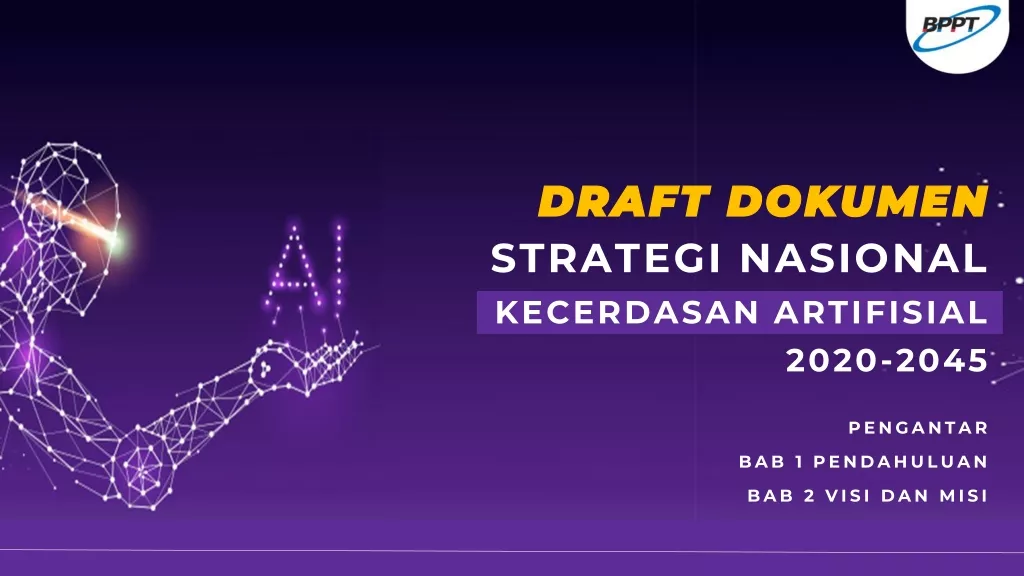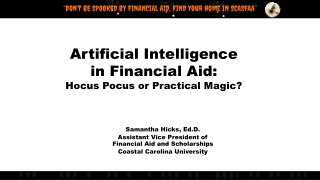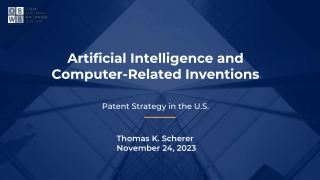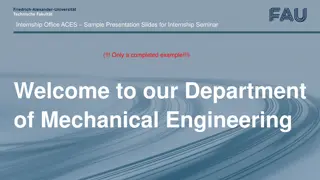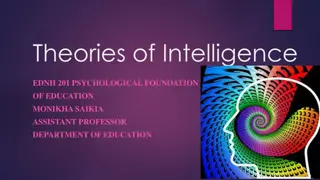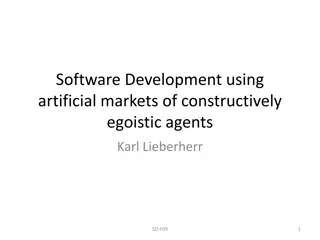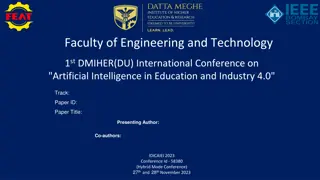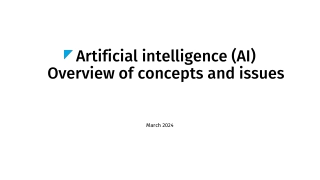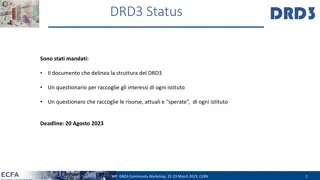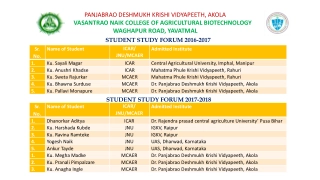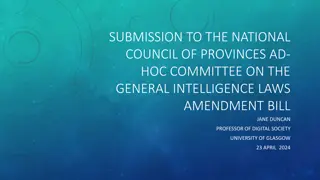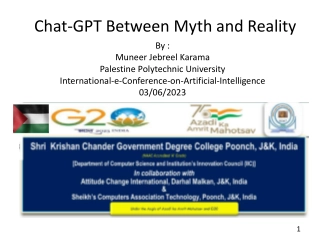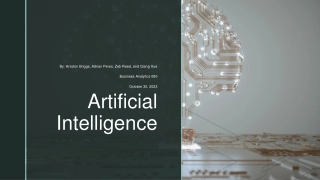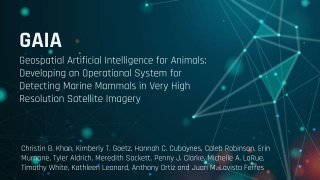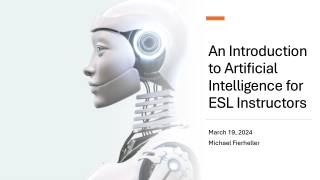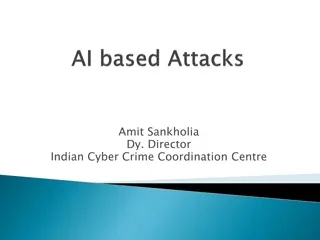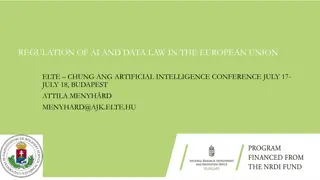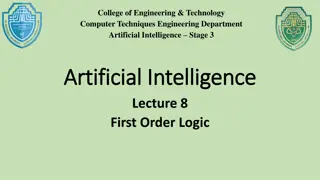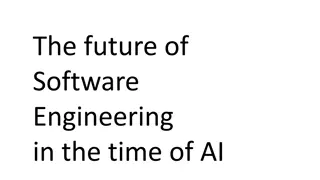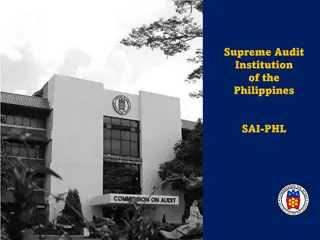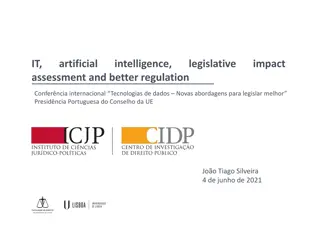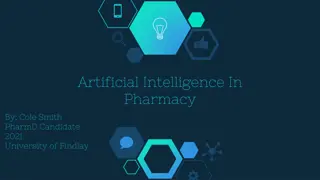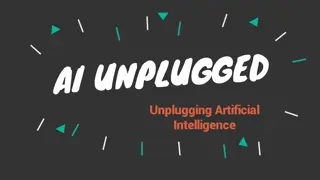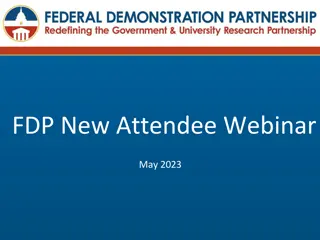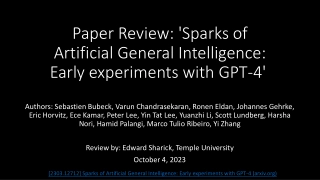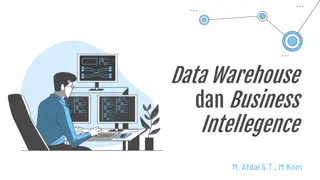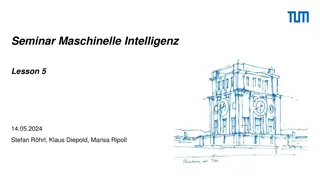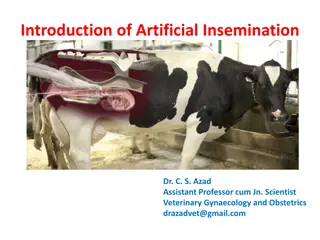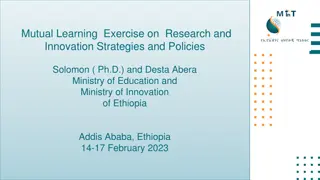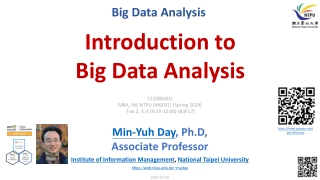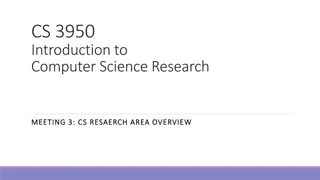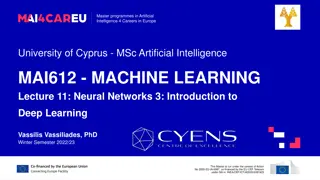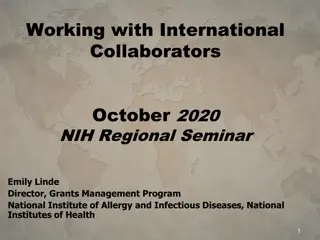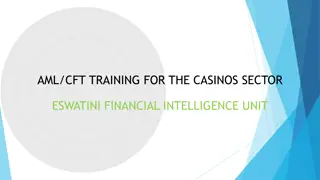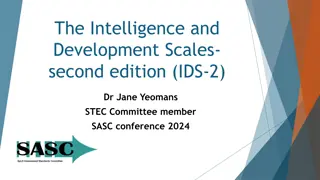National Artificial Intelligence Research Institutes Overview
Delve into the details of the National Artificial Intelligence Research Institutes program with insights on accelerating research, transforming society, and nurturing the American workforce. Explore the themes, program leads, and future steps outlined in the webinar. Get ready to submit your questions and engage with the forefront of AI research initiatives.
Download Presentation

Please find below an Image/Link to download the presentation.
The content on the website is provided AS IS for your information and personal use only. It may not be sold, licensed, or shared on other websites without obtaining consent from the author. Download presentation by click this link. If you encounter any issues during the download, it is possible that the publisher has removed the file from their server.
E N D
Presentation Transcript
National Artificial Intelligence (AI) Research Institutes Accelerating Research, Transforming Society, and Growing the American Workforce James Donlon, CISE/IIS Program Webinar, September 5, 2023 https://new.nsf.gov/funding/opportunities/national-artificial-intelligence-research Slides will be linked to the program page within a day or two after the Webinar Click the 'Q&A' button to submit a question
Questions Submit your questions using the Q&A module Will answer questions live (perhaps some in the module) Theme leads are here to address your theme questions If your question is not answered, feel free to email programmatic questions to AIInstitutesProgram@nsf.gov; theme-related questions to relevant program contacts Webinar materials (slides, script, and audio recording) will be linked on the program/webinar web page Program Webinar 09/05/2023 Click the 'Q&A' button to submit a question 2
Program/Theme Leads Theme Program-Wide Principal contacts James Donlon, CISE/IIS 1. AI for Astronomical Sciences Andreas Berlind, MPS/AST 2. AI for Discovery in Materials Research Serdar Ogut, MPS/DMR 3. Strengthening AI Hector Munoz-Avila, CISE/IIS Program Webinar 09/05/2023 Click the 'Q&A' button to submit a question 3
Welcome Dr. Sethuraman Panch Panchanathan Director, National Science Foundation 4 Program Webinar 09/05/2023 Click the 'Q&A' button to submit a question
Next Steps in the AI Institutes Program Dr. Margaret Martonosi NSF Assistant Director for Computer and information Science and Engineering (CISE) Program Webinar 09/05/2023 Click the 'Q&A' button to submit a question 5
National Artificial Intelligence (AI) Research Institutes Founded on National AI R&D Strategic Plan Partnership among federal agencies and with the private sector Program Webinar 09/05/2023 Click the 'Q&A' button to submit a question 6
25 Active Institutes 2020: First cohort of Institutes (5 NSF, 2 NIFA) 2021: Second cohort of Institutes (9 NSF, 2 NIFA) 2022: AI Institutes Virtual Organization established 2023: Third cohort of Institutes (6 NSF, 1 NIFA) AI Institutes directory and news: https://aiinstitutes.org Program Webinar 09/05/2023 Click the 'Q&A' button to submit a question 7
This Solicitation NSF 23-610 Advance AI through use-inspired research Astronomical Sciences 2024: AI advances for by mining, analyzing, and extracting knowledge from astronomical data Materials Research 2025: AI advances that revolutionize materials discovery and understanding, builds upon the Materials Genome Initiative (MGI) Strengthening AI 2025: Toward AIs that understand the concepts they reason over, change their behavior in response to users, and align with societal expectations Program Webinar 09/05/2023 Click the 'Q&A' button to submit a question 8
AI Institutes advance trustworthy AI that protects peoples rights and safety, and accelerates the Nation s progress https://www.whitehouse.gov/wp-content/uploads/2023/08/FY2025-OMB-OSTP-RD-Budget-Priorities-Memo.pdf Program Webinar 09/05/2023 Click the 'Q&A' button to submit a question 9
Outline National Artificial Intelligence (AI) Research Institutes Accelerating Research, Transforming Society, and Growing the American Workforce PROGRAM SOLICITATION NSF 23-610 - Program overview and structure - Requirements for all AI Institutes - Theme-specific guidance - Proposal submission considerations - Questions Program Webinar 09/05/2023 Click the 'Q&A' button to submit a question 10
National Artificial Intelligence (AI) Research Institutes Sustained investments in AI research in areas with the potential for long-term payoffs. Emphasis on convergent foundational and use-inspired research focused on societal challenges and enhancing national competitiveness in AI. - Goals of each Institute: - Significantly advance research in AI in a multi-disciplinary, multi-institutional collaborative setting - Accelerate the development of transformational, AI-powered innovation - Grow a workforce of future AI researchers and practitioners - Nexus points for Institute-level collaboration between universities, federal agencies, industries, and nonprofits Program Webinar 09/05/2023 Click the 'Q&A' button to submit a question 11
New/changes - Program structure and requirements remain largely unchanged from previous solicitation - Take note of these revisions 1. New themes for Institute proposals 2. New NSF funding partners 3. Enhanced description of "use inspired research" to emphasize research convergence as a means for foundational AI goals 4. Different submission timelines for two different funding years Program Webinar 09/05/2023 Click the 'Q&A' button to submit a question 12
Program Timeline 1. Astronomy 2. Materials 3. Strengthening AI Jul 31, 2023 Today Jan 12, 2024 Mid-Feb 2024 Milestone Solicitation release/ Webinar Preliminary proposals due Results of preliminary proposal review Full proposals due Schedule Reverse Site Visits Reverse Site Visits Anticipated start date of awards Jul 31, 2023 Today Oct 31, 2023 Early Dec 2023 Feb 16, 2024 Apr-May 2024 May-Jun 2024 Oct 1, 2024 May 17, 2024 Oct 2024 Nov-Dec 2024 Jun 1, 2025 Program Webinar 09/05/2023 Click the 'Q&A' button to submit a question 13
Requirements for All AI Research Institutes 1. Advance foundational AI research 2. Conduct use-inspired research 3. Grow the next generation of talent 4. Be multidisciplinary 5. Leverage multiple organizations 6. Be nexus points for collaborative efforts 14 Program Webinar 09/05/2023 Click the 'Q&A' button to submit a question
1. Advance Foundational AI Research - Add significant new knowledge and understanding to artificial intelligence and demonstrate the potential to radically advance areas beyond the state of the art. - Address new foundational AI research priorities that arise from rapid advances in AI and the increasing ubiquity of AI-enabled technology. - Address areas in clear need of larger efforts over longer timeframes; the research will have broad and lasting impact. Institute proposals that do not describe a clear plan to achieve ambitious advances in foundational AI research are not likely to be responsive to this program 15 Program Webinar 09/05/2023 Click the 'Q&A' button to submit a question
1. Advance Foundational AI Research: Scope of AI - Understanding the mechanisms underlying thought and intelligent behavior and their implementation in machines. - Core theory and methods that give rise to these abilities and their implementation in machines - Research in all matters of learning, abstraction, and inference required for intelligent behavior. - General architectures for intelligence, integrated intelligent agents, and multiagent systems. 16 Program Webinar 09/05/2023 Click the 'Q&A' button to submit a question
1. Advance Foundational AI Research: Scope of AI, continued - AI is a multidisciplinary endeavor - Computational methods draw insight from fields such as biology, neuroscience, behavioral and cognitive science. - Computer vision and human-language technologies provide critical capabilities to many AI systems. - Robotics is closely aligned with but not identical to embodied AI. AI systems may be able to act upon the world through embodiment. 17 Program Webinar 09/05/2023 Click the 'Q&A' button to submit a question
2. Conduct Use-Inspired Research - Use-inspired AI research is basic research that has use for society in mind. - Use-inspired research is a context that informs foundational AI advances and drives innovations in related sectors through use cases, affording: - Clear and compelling goals to advance AI and to accelerate the fielding of AI-powered innovation. - The transfer of knowledge through the meaningful exchange of scientific and technical information with internal participants and external stakeholders. - The potential for the creation and sharing of community infrastructure, including data and software, to further research, promote reproducibility, and support education. - Within the use-inspired context, balance the application of AI with the advancement of foundational AI as appropriate to your Institute vision 18 Program Webinar 09/05/2023 Click the 'Q&A' button to submit a question
Foundational and Use-Inspired AI Research Use-inspired, e.g., environmental protection scientific discovery civic & public good manufacturing health and wellbeing enginnered systems Foundational AI results Use-inspired AI research AI foundations, e.g., learning, abstraction, and inference Use cases agents and multiagent systems reasoning, uncertainty, causality grounding, instructibility, alignment Program Webinar 09/05/2023 Click the 'Q&A' button to submit a question 19
Foundational AI and use-inspired research requirements are not in opposition to one another Not separate from , and not merely applied Solicitation Introduction: Use-inspired research is an expected modality of an Institute's foundational AI research Ideally there is a virtuous cycle resulting from deeply integrated convergent research in which AI advances are motivated by domain challenges, and those domains benefit from new AI advances. Program Description: It is critical that proposals clearly specify how the use-inspired context for Institute research reveals the opportunities for foundational AI advances and how those foundational AI advances in turn contribute to the related sectors that define the use-inspired context. Solicitation Specific Review Criteria: How well does the proposed Institute leverage the use-inspired research context to both advance AI and drive innovations in related sectors of science and engineering, segments of the economy, or societal needs? 20 Program Webinar 09/05/2023 Click the 'Q&A' button to submit a question
3. Grow The Next Generation of Talent - Drive education about AI across educational levels and institution types, including post-secondary, workforce training, and other public education. - Develop innovative pedagogy and instructional materials, advanced learning technologies, project-driven training, cross-disciplinary and collaborative research, industry partnerships, and new career pathways. - Offer broad, deep, and diverse experiences with a focus on broadening participation among the full range of groups traditionally under- represented in science and engineering. - Leverage the visionary research focus and integrate education and workforce development for a whole greater than the sum of its parts. 21 Program Webinar 09/05/2023 Click the 'Q&A' button to submit a question
4. Be Multidisciplinary - Coherent multidisciplinary groups of scientists, engineers and educators appropriate for a large-scale, long-term research agenda for the advancement of AI and the fielding of AI-powered innovation. - Catalyze foresight and adaptability beyond what is possible in single research projects. - Significant integration of multidisciplinary research can be a significant basis of confidence that your proposed Institute will be greater than the sum of its parts . 22 Program Webinar 09/05/2023 Click the 'Q&A' button to submit a question
5. Leverage Multiple Organizations - Create significant new research capabilities in new centers of AI leadership. - Create a network for broadening participation from underrepresented groups and diverse institutions. - Multiple organizations meaningfully integrated into a diverse Institute is another way to form a whole greater than the sum of its parts . - Will be staffed with a Managing Director or Project Manager (distinct from the lead PI) and a suitable Management Team. - Will have an External Advisory Board - non-collaborators who are a source of objective, external advice Potential Advisory Board members should not be approached or identified until the Institute is funded 23 Program Webinar 09/05/2023 Click the 'Q&A' button to submit a question
6. Nexus Points for Collaborative Efforts - As nexus points, Institutes have the potential to continue to connect with new partners for continued growth and opportunities -- another way to be greater than the sum of its parts . - The "nexus point" function in this program is not a mere state of being for an Institute. You should describe as appropriate your priorities, programs, mechanisms, and other considerations for operating as a nexus point. - Continuing growth of collaborations with external partners can bring together people, ideas, problems, and technical approaches for maximum impact and for broadening participation beyond the members and the boundaries of the Institute itself. - Promote organizational collaborations among the best teams and approaches from institutions of higher education, federal agencies, industry, and nonprofits/foundations. 24 Program Webinar 09/05/2023 Click the 'Q&A' button to submit a question
This solicitations Institute themes This year, proposals are being solicited in three high-priority areas: Preliminary proposals: October 31, 2023 Full proposals: February 16, 2024 Anticipated Start date: October 1, 2024 1. AI for Astronomical Sciences Preliminary proposals: January 12, 2024 Full proposals: May 17, 2024 Anticipated Start date: June 1, 2025 2. AI for Discovery in Materials Research 3. Strengthening AI NSF estimates approximately 5 awards: two in theme 1, one in theme 2, two+ in theme 3, all subject to availability of funds. 25 Program Webinar 09/05/2023 Click the 'Q&A' button to submit a question
Responsiveness to themes - Can I submit an Institute proposal that responds to multiple themes? Is it a good idea? - The solicitation does not prohibit this, but it is not encouraged, either. - It is most effective to respond as fully as possible to the scope of the theme you addressed. - Relevance to other themes might be identified in the proposal text and/or keywords included in the Project Summary. - Consult program contacts in the respective themes for advice 26 Program Webinar 09/05/2023 Click the 'Q&A' button to submit a question
1: AI for Astronomical Sciences Preliminary Proposals Oct 31, 2023 DKIST EHT NOAO DES Full Proposals Feb 16, 2024 Start Date Oct 1, 2024 ALMA N-body Current and future astronomical experiments are poised to provide a firehose of data over a wide range of wavelengths of light and with high temporal cadence. AI will be essential for mining, analyzing, and extracting knowledge from these data. In partnership with the Simons Foundation, we aim to fund up to two institutes to help address these challenges and to elevate AI research and education within the astronomy community. 27 Program Webinar 09/05/2023 Click the 'Q&A' button to submit a question
1: AI for Astronomical Sciences Proposals to this theme should - Identify important challenges in astronomy research that will be addressed by the proposed institute. - Describe the advances in foundational AI that will be needed to tackle these challenges. - Foundational AI and astronomy work should be well integrated - Present an ambitious plan for the proposed institute to serve as a hub of AI knowledge and education for the broader astronomical community, including researchers and institutions that do not have easy access to cutting-edge data and methods. - Clearly describe the organization and management structure of the institute, including the roles of the different organizations and team members. 28 Program Webinar 09/05/2023 Click the 'Q&A' button to submit a question
1: AI for Astronomical Sciences Common questions - What areas of astronomy are eligible? - All areas of astronomy that are supported by the AST Division: planetary, solar, stellar, Galactic, extragalactic, cosmology; multi-messenger; theory - What about research that touches on neighboring fields, like physics? - Research activity in other fields is ok as long as the main focus is astronomy - What about space-based astronomy? - This is not restricted. The proposed AI work can involve space-based as well as ground-based data. The important thing is that the proposed research is sufficiently ambitious given the size and scale of these awards. - Is it better for a proposal to tackle one astronomy challenge in depth or to touch on a broad set of topics? - The solicitation does not restrict this. It is most important that your chosen astronomy research is sufficiently impactful and well-integrated with foundational AI work. - Do the NSF and SF have different priorities in this solicitation that need to be balanced? - No. The theme is intended to be broad and both funding partners welcome all ideas from the research community. 29 Program Webinar 09/05/2023 Click the 'Q&A' button to submit a question
1: AI for Astronomical Sciences Simons Foundation specific considerations Half of the proposed budget (up to $10M) must be prepared by following instructions from the Simons Foundation, included with the announcement of this funding opportunity at the Simons Foundation website and submitted as a supplementary document. (https://www.simonsfoundation.org/mathematics- physical-sciences/funding/request-for-applications/). Note that the Simons Foundation has a specific indirect cost rate policy. Award budgets must reflect a clear delineation between NSF-funded effort/activities and SF-funded effort/activities, with no overlap between the two budgets. In addition to the NSF PI meetings, SF will organize and fund annual PI meetings at SF in New York City as a part of the report requirements for awards made by SF. SF personnel may observe panels and participate in NSF merit review deliberations as a funding entity. Both NSF and SF will evaluate the proposal and budget as a whole. The way in which the budget is split among the two portions will not affect proposal review. 30 Program Webinar 09/05/2023 Click the 'Q&A' button to submit a question
1: AI for Astronomical Sciences Individuals affiliated with Simons Foundation - You are strongly encouraged to consult with SF and ensure compliance with SF s policy on the Eligibility of SF Employees for External Funding or Resources. - Individuals affiliated with SF may participate in proposals to Theme 1 on an unfunded basis if they - (i) hold another appointment at another organization (e.g., an academic appointment at an institution of higher education), as applicable to and defined by that organization, and - (ii) do so strictly in their capacity at that other organization. - Individuals may not participate in a proposal to Theme 1 in their capacity with SF. Click the 'Q&A' button to submit a question 31 Program Webinar 09/05/2023
2: AI for Discovery in Materials Research - Powerful AI technologies have the potential to revolutionize materials discovery and understanding. Preliminary Proposals Jan 12, 2024 - This theme builds upon DMR s current impactful efforts on the Materials Genome Initiative (MGI) and expands the scale and integration of scientific challenges to enable disruptive AI-based breakthroughs in materials research. Full Proposals May 17, 2024 Start Date June 1, 2025 - A successful Materials AI institute is expected to transform the materials discovery landscape, enable new AI-based capabilities, and be responsive to societal challenges and industrial needs. - Intel Cooperation is providing partial support for this institute theme. - Proposals that advance both foundational AI and fundamental materials research in domains supported by DMR will be most responsive to this theme. Contact program officers in this theme to address specific questions about responsiveness. 32 Program Webinar 09/05/2023 Click the 'Q&A' button to submit a question
Materials Genome Initiative (MGI) Materials Genome Initiative (MGI) https://www.mgi.gov/ https://www.mgi.gov/ The MGI is a federal multi-agency initiative for discovering, manufacturing, and deploying advanced materials twice as fast and at a fraction of the cost compared to traditional methods. The initiative creates policy, resources, and infrastructure to support U.S. institutions in the adoption of methods for accelerating materials development. 2021 MGI STRATEGIC PLAN: 3 GOALS 1. Unify the Materials Innovation Infrastructure (MII), a framework of integrated advanced modeling, computational and experimental tools, and quantitative data 2. Harness the power of materials data 3. Educate, train, and connect the materials research and development workforce DMREF https://dmref.org/ 33 Program Webinar 09/05/2023 Click the 'Q&A' button to submit a question
2: AI for Discovery in Materials Research - The theme description is material and application-domain agnostic. - The list in the solicitation is meant to stimulate thought on research at the intersection of AI and materials and is not prescriptive. * Multi-modal data integration & dataset development * Foundational AI advances driven by materials research * First synthesis to synthesis at scale * Human-augmented materials design * Interpretable materials AI - The proposals responsive to this theme can address any area(s) of materials research aligned with DMR and may employ tools for experiment/theory/computation). - Potential generalizability of the choice of materials/materials problems/AI research to other materials science problems and foundational AI research is likely to align with the AI ambition to generalize from data. 34 Program Webinar 09/05/2023 Click the 'Q&A' button to submit a question
2: AI for Discovery in Materials Research Industry Funding Partner - Intel will not participate in or observe panels/merit review. - Individuals affiliated with Intel are not allowed to participate in proposals to Theme 2 in their capacity at Intel (but may be able to do so in their capacity at another organization). - Proposers should NOT contact Intel about proposals to this theme or make any prior arrangements for collaborations in this theme during the proposal process. - After award, Intel may offer collaboration opportunities to the funded Institute(s) in the theme, including software, data sets, other computing infrastructure, and/or researchers-in-residence. 35 Program Webinar 09/05/2023 Click the 'Q&A' button to submit a question
3: Strengthening AI Preliminary Proposals Jan 12, 2024 Full Proposals May 17, 2024 - AI systems built with multilayer architectures trained on massive datasets have become increasingly capable of producing useful and impressive outputs. - Unfortunately, these systems are not always reliable and may not exhibit justification for their behavior that is understandable to the people who interact with them. - These systems can be brittle, susceptible to manipulation or anti-machine strategies, and produce outputs that do not align with human expectations of truth or human values. - AI systems of the future will need to be strengthened if they are to be as robust as we would like and if we are to keep such technology well-aligned with society s intended uses Start Date June 1, 2025 Program Webinar 09/05/2023 Click the 'Q&A' button to submit a question 36
3: Strengthening AI - Institutes funded under this theme must lead advances in theory, methods, or integrative approaches that strengthen AI in all three of the goals listed below: Grounding Alignment Instructability 37 Program Webinar 09/05/2023 Click the 'Q&A' button to submit a question
3: Strengthening AI - Institutes funded under this theme must lead advances in theory, methods, or integrative approaches that strengthen AI in all three of the goals listed below: Systems must understand the concepts they reason over and operate with. Allows AI system to demonstrate connection between its outputs and the abstract concepts that they operate with. It will also enable systems to understand their risks and limitations. Grounding Alignment Instructability 38 Program Webinar 09/05/2023 Click the 'Q&A' button to submit a question
3: Strengthening AI - Institutes funded under this theme must lead advances in theory, methods, or integrative approaches that strengthen AI in all three of the goals listed below: Systems can be proven experimentally to change their behavior appropriately in response to explicit feedback provided by even non-expert users. Systems implement more effective and trustworthy assistance to humans Grounding Alignment Instructability 39 Program Webinar 09/05/2023 Click the 'Q&A' button to submit a question
3: Strengthening AI - Institutes funded under this theme must lead advances in theory, methods, or integrative approaches that strengthen AI in all three of the goals listed below: Systems must be judged by how well their operations align with expectations of objective truths in a domain and correspond to societal expectations and human intentions in their operations Grounding Alignment Instructability 40 Program Webinar 09/05/2023 Click the 'Q&A' button to submit a question
3: Strengthening AI - Any AI approaches that contribute to any of these goals are in scope. - This might include but is not limited to neuro-symbolic approaches, hybrid integrated architectures, or multi- representational learning methodologies. - Proposals that rely mainly on continuing growth of data- driven models and their access to more data are not responsive to the three goals above Program Webinar 09/05/2023 Click the 'Q&A' button to submit a question 41
3: Strengthening AI Industry Funding Partner - Partners (including Capital One) are expected to contribute to a single Institute awarded under this theme. - Capital One will not participate in or observe panels/merit review. - Individual affiliated with Capital One are not allowed to participate in proposals to Theme 3 in their capacity at Captial One (but may be able to do so in their capacity at another organization). - Proposers should NOT contact Capital One about proposals to this theme or make any prior arrangements for collaborations in this theme during the proposal process. - After award, the Capital One may offer collaboration opportunities to the funded Institute(s) in the theme, including software, data sets, other computing infrastructure, and/or researchers-in-residence. 42 Program Webinar 09/05/2023 Click the 'Q&A' button to submit a question
3: Strengthening AI Agency Funding Partners - OUSD (R&E) and NIST have partnered with NSF to potentially contribute funding to Institutes funded under this theme. This is not a firm agreement to participate in the funding of awards. - Submitters to Theme 3 may submit an optional supplementary document (at both prelim and full proposal stage) to indicate relevance of your proposal to one or more partners. See solicitation. - Submitters to Theme 3 may submit an optional single-copy document (at both prelim and full proposal stage) to indicate an objection to partner funding. See solicitation. - Documents submitted with the preliminary proposal pertain only to that proposal. Those submitted with the full proposal pertain only to that proposal. 43 Program Webinar 09/05/2023 Click the 'Q&A' button to submit a question
Contacting the program about themes - Can we consult with program contacts about our proposal plans? - Yes! Program contacts prefer that you email your questions. - Send email to AIInstitutesProgram@nsf.gov for program-wide and submission questions - Send to all listed theme contacts for those questions - You might include a project summary of up to two pages if asking about responsiveness - AFTER THE PRELIMINARY PROPOSAL DEADLINE, interaction will be limited to clarification of the feedback received on the preliminary proposal. 44 Program Webinar 09/05/2023 Click the 'Q&A' button to submit a question
Structure and budget: Cooperative Agreements for 4-5 yr/$16-20M institutes to award in 2023 Average $4m/year year-to-year budgets may vary, as long as the total request does not exceed $20M. Include travel budgets for applicable personnel to attend annual PI meetings, attendance at up to three site visits (and/or reverse site visits) as well as other planned cross-Institute meetings, to include the retreat required in Special Award Conditions. It is recommended that you include budget as needed for institute administration, including the required Managing Director 45 Program Webinar 09/05/2023 Click the 'Q&A' button to submit a question
Preliminary Proposals - Requirements MUST be submitted prior to a full proposal 6-page project description: Primary focus on the scope of proposed research activities and the suitability of personnel to carry them out Sections: A. Vision.. research goals B. Foundational AI research C. Use-Inspired Research D. Broader Impacts E. Key Personnel / organization Do not include: Results from Prior NSF Support Budget and Budget Justification Data Management Plan Postdoc Mentoring Plan Current and Pending Support Facilities, Equipment, Letters of Collaboration Program Webinar 09/05/2023 Click the 'Q&A' button to submit a question 46
Preliminary Proposals Process and Benefit Submitted to a theme Reviewed internally at NSF with applicable partners Advisory (i.e., non-binding) Encourage / Discourage decision ~ 1 month turnaround Benefits of Preliminary Proposal Stage: Affords more time for high quality proposal development Early feedback about responsiveness to the solicitation Allows teams to adjust proposals and plans based on feedback Reduces effort preparing proposals unlikely to succeed in a competition with few awards. More NSF policy on preliminary proposals in the PAPPG. Program Webinar 09/05/2023 Click the 'Q&A' button to submit a question 47
About non-binding decisions - May submitters who receive an unfavorable ( Discourage ) review of the Preliminary proposal nonetheless submit a Full proposal? - Yes, this is allowable. - Make your decisions carefully -- each theme is highly selective. - For discouraged proposals, it is assumed that significant revision would be needed to have a chance to succeed as a Full proposal. 48 Program Webinar 09/05/2023 Click the 'Q&A' button to submit a question
Changes from Preliminary to Full? - What can change from the Preliminary to the Full proposal? - The Full proposal must be submitted by the same lead organization and to the same theme. - Many other aspects may change as appropriate - It is permissible for subawardee organizations and anticipated partnerships or collaborations to change. - Your proposal title may change - You may change personnel and their roles. - You will summarize significant updates in the Full proposal in a required (1 page) single copy document 49 Program Webinar 09/05/2023 Click the 'Q&A' button to submit a question
Personnel moves i.e., to a different proposal between prelim and full proposal - May an individual be listed as Senior Personnel on a Preliminary proposal, and then later listed as Senior Personnel on a Full proposal from another submitter (i.e., based on a different Preliminary proposal)? - Yes, this is allowable, as long as the individual is listed on at most one proposal at each stage. 50 Program Webinar 09/05/2023 Click the 'Q&A' button to submit a question
